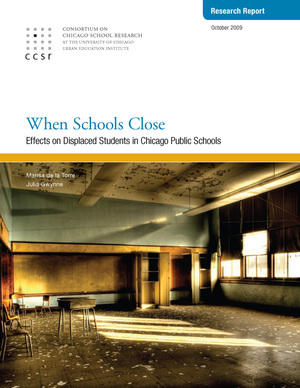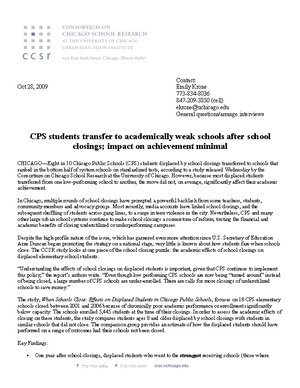1. Where do students go after their schools close? How different are the receiving schools from the closing schools?
2. Do displaced students suffer any kind of disruption in learning due to the closing of their schools? If so, when does it start and how long does it last?
3. Do school closings improve the educational prospects of displaced students?
4. Do characteristics of receiving schools shape the educational prospects of displaced students? If so, what are those school characteristics and how much do they help students?
This report reveals that eight in 10 Chicago Public Schools (CPS) students displaced by school closings transferred to schools ranking in the bottom half of system schools on standardized tests. However, because most displaced students transferred from one low-performing school to another, the move did not, on average, significantly affect student achievement.
The report demonstrates that the success of a school closing policy hinges on the quality of the receiving schools that accept the displaced students. One year after school closings, displaced students who re-enrolled in the weakest receiving schools (those with test scores in the bottom quartile of all system schools) experienced an achievement loss of more than a month in reading and half-a-month in math. Meanwhile, students who re-enrolled in the strongest receiving schools (those in the top quartile) experienced an achievement gain of nearly one month in reading and more than two months in math.
The authors focused on 18 CPS elementary schools closed between 2001 and 2006 due to chronically poor academic performance or enrollment significantly below capacity. The schools enrolled 5,445 students at the time of their closings. To assess the academic effects of closing on these students, the study compares students ages 8 and older displaced by school closings with students in similar schools that did not close. The comparison group provides an estimate of how the displaced students should have performed on a range of outcomes had their schools not been closed.
The study reflects Consortium’s commitment to studying education issues that are top priorities in Chicago and districts nationwide. In Chicago, multiple rounds of school closings have prompted a powerful backlash from some teachers, students, community members and advocacy groups. Nevertheless, CPS and many other large urban school systems continue to make school closings a cornerstone of reform, touting the financial and academic benefits of closing underutilized or underperforming campuses.



